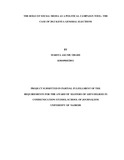| dc.description.abstract | This study explored the role of social media in the Kenya 2013 general elections. The
overall objective was to find out the function of social media as a political campaign tool.
The study had three specific objectives which were; to find out the specific ways that
social media was used by citizens in the 2013 general elections. The study also sought to
evaluate the ways that social media was used by politicians and media in the 2013
general elections.
This study was guided by a rich literature review which was supported by a conceptual
framework and three theories of communication which were; agenda setting theory, the
public sphere theory and social identity theory.
Research was conducted through collection of qualitative and quantitative data; methods
used were FGD and case study survey through distribution of questionnaires. The
collected data were sorted, analyzed and interpreted in relation to the research objectives.
The findings were presented using tables, graphs, pie charts, quotes and narratives.
The study found that social media enhanced political participation amongst in the 2013
general elections however it also contributed to hate speech, propaganda and ethnicity
leading to polarization of citizens on lines of political affiliation. Therefore the study
recommends establishment of a social media regulation framework by the government. | en_US |

